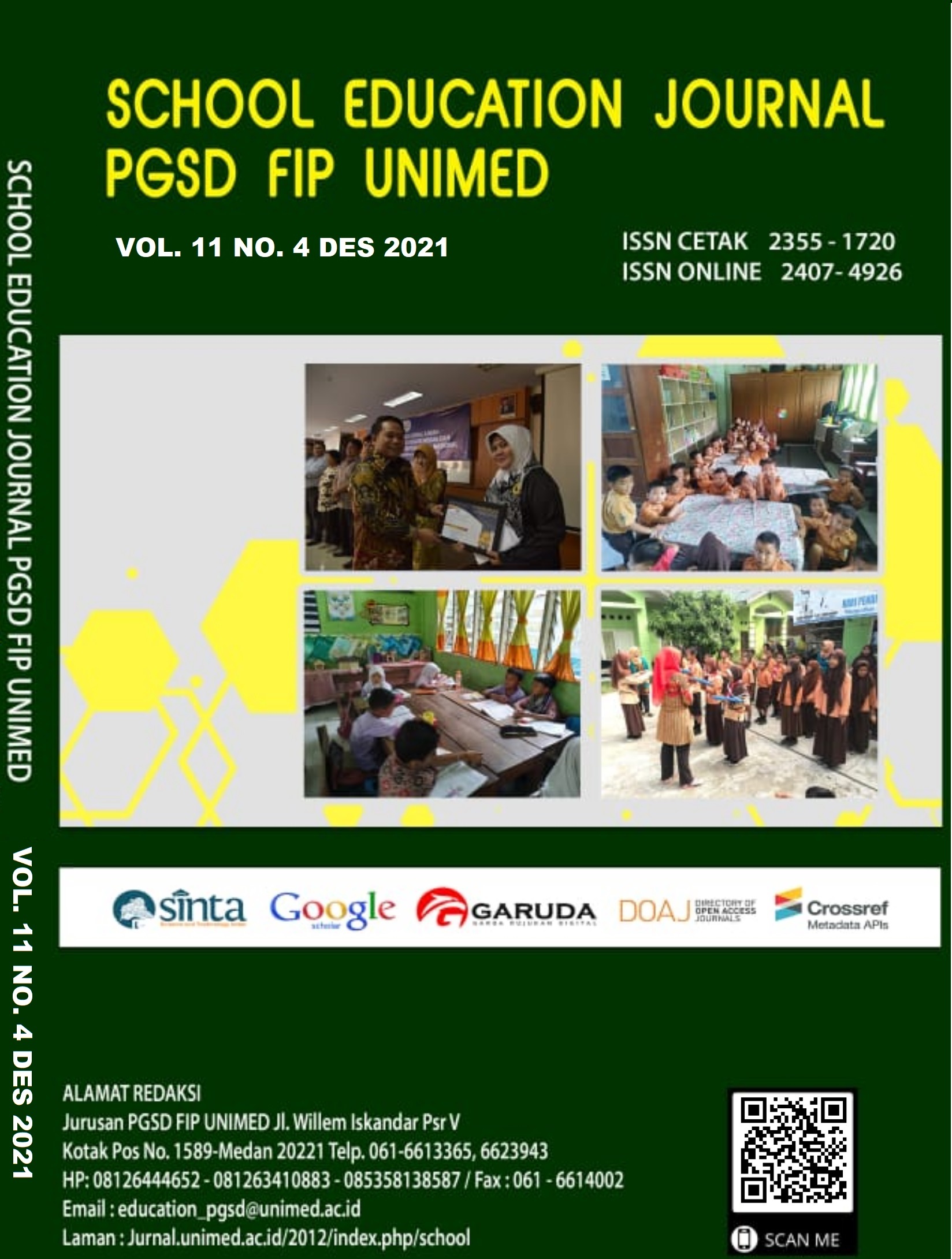INDONESIAN ELEMENTARY SCHOOLS TEACHERS™ ATTITUDE TOWARDS VIDEO CONFERENCING PLATFORM IMPLEMENTATION DURING COVID-19 PANDEMIC
DOI:
https://doi.org/10.24114/sejpgsd.v12i4.40420Keywords:
Elementary Schools Teacher, Teachers’ Attitude, Video Conferencing, Distance Learning, Learning During PandemicAbstract
This study is identifying elementary schools teacher attitudes towards video conferencing platform implementation during Covid-19 pandemic. The research aims include (1) to identify teachers™ attitude towards implementing video conferencing platforms for learning (2) to identify teachers' challenges encountered during implementing video conferencing and how to overcome that challenge. The 103 elementary schools teachers were included. The teacher selected by simple random sampling techniques. The questionnaire's content is based on teachers' attitudes toward using video conferencing in the classroom during the COVID-19 epidemic, as measured by the following indicators: efficiency, effectiveness, motivation, and variety of obstacles. The elementary schools teachers™ attitude shows positive responses to video conferencing in learning such as providing various learning activities, providing flexibility in teaching process, easiness to access learning materials, and ease in assessing and monitoring students' learning progress. Furthermore, the result reveals the majority of the elementary schools teachers faced technical issues and availability as obstacles in implementing a video conferencing platform. The majority of elementary schools teachers were able to resolve these technological difficulties by exploring other teaching strategies and seeking professional advice.References
Ajzen, I., & Madden, T. J. 1986. Prediction of goal-directed behavior: Attitudes, intentions, and perceived behavioral control. Journal of experimental social psychology, 22(5), 453-474. https://doi.org/10.1016/0022-1031(86)90045-4
Ghavifekr, S. & Rosdy, W.A.W. 2015. Teaching and learning with technology: Effectiveness of ICT integration in schools. International Journal of Research in Education and Science (IJRES), 1(2), 175-191. https://doi.org/10.21890/ijres.23596
Gladović, P., Deretić, N., and Drašković, D. 2020. Video Conferencing and its Application in Education. JTTTP-Journal of Traffic and Transport Theory and Practice, 5(1), 45-48. https://doi.org/10.7251/JTTTP2001045
Huang, H. M., & Liaw, S. S. 2005. Exploring users' attitudes and intentions toward the web as a survey tool. Computers in human behavior, 21(5), 729-743. https://doi.org/10.1016/j.chb.2004.02.020
Jain, V. 2014. 3D model of attitude. International Journal of Advanced Research in Management and Social Sciences, 3(3), 1-12. Retrieved online from. https://www.semanticscholar.org/paper/3D-MODEL-OF-ATTITUDE-Jain/eacc4246adf9ec72740f0b2dadff7c12f48e786c
Kang, M., & Im, T. 2013. Factors of learner“instructor interaction which predict perceived learning outcomes in online learning environment. Journal of Computer Assisted Learning, 29(3), 292-301. https://doi.org/10.1111/jcal.12005
Kreitner, R, & Kinicki A. 2007. Organizational Behavior 7th Edition, Boston: McGraw-Hill. Retrieved online from https://archive.org/details/organizationalbe0007krei
Legault, L. 2016. Intrinsic and Extrinsic Motivation. In: Zeigler-Hill, V., Shackelford, T.K. (eds) Encyclopedia of Personality and Individual Differences. Springer. https://doi.org/10.1007/978-3-319-24612-3_1139
Mahdum, M., Hadriana, H., and Safriyanti, M. 2019. Exploring Teacher Perceptions and Motivations to ICT Use in Learning Activities in Indonesia. Journal of Information Technology Education, 18, 293-317. https://doi.org/10.28945/4366
Oropesa-Vento, M., GarcÃa-Alcaraz, J. L., Rivera, L., & Manotas, D. F. 2015. Effects of management commitment and organization of work teams on the benefits of Kaizen: Planning stage. Dyna, 82(191), 76-84. https://doi.org/10.15446/dyna.v82n191.51157
Pedersen, C., White, R., & Smith, D. 2012. Usefulness and reliability of online assessments: a Business Faculty's experience. International Journal of Organisational Behaviour, 17(3), 33-45. Retrieved online from https://eprints.usq.edu.au/22439/
Ping L. C, Teo Y. H, Wong P., Khine M. S, Ching Sing Chai S, Divaharan H. 2003. Creating a conducive learning environment for the effective integration of ICT: classroom management issues. Journal of Interactive Learning Research, 14(4): 405“423. Retrieved online from https://www.learntechlib.org/primary/p/14519/.
Teo, T. 2008. Pre-service teachers™ attitudes towards computer use: A Singapore survey. Australasian Journal of Educational Technology, 24(4). 413-424. https://doi.org/10.14742/ajet.1201
Uvarov, A., Varlamova, J., Miao, F., & Domiter, A. 2019. Anytime, anywhere learning for improved education results in Russia. Retrieved online from https://www.gcedclearinghouse.org/sites/default/files/resources/190151eng.pdf
Yusuf, M. O., & Balogun, M. R. 2011. Student-teachers' competence and attitude towards Information and communication technology: A case study in a Nigerian University. Contemporary educational technology, 2(1), 18-36. Retrieved online from https://dergipark.org.tr/en/pub/cet/issue/25723/271426.
Published
Issue
Section
License
Authors whose manuscripts are approved are approved as follows:
- The publication rights for all journal manuscript materials published/published on the SEJ (School Education Journal) E-Journal site are held by the editorial board with the author's knowledge (moral rights remain with the manuscript authors).
- The formal legal requirements for accessing this electronic digital journal article are subject to the terms of the Creative Commons Attribution-ShareAlike (CC BY-SA 4.0) license, which means that E-Journal SEJ (School Education Journal) has the right to store, transfer media/format, manage in the form of a database, maintain, and publish articles without asking permission from the author as long as the author's name remains as the copyright owner.
- Manuscripts published/published electronically are open access for educational, research, and library purposes.










